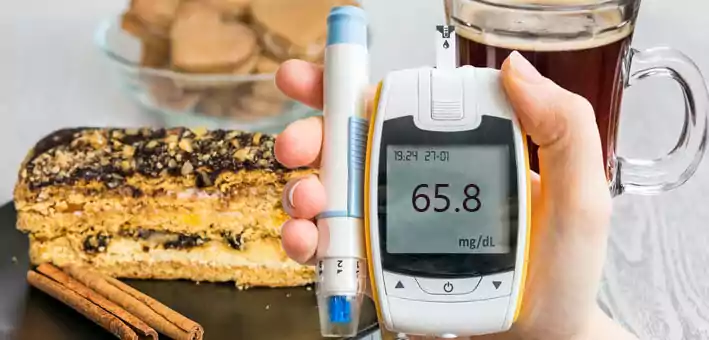PCOS test is based on the Rotterdam criteria for diagnosing PCOS.

Complications
What Is It?
If you are diabetic, you should know that Diabetic Shock or Extreme Hypoglycemia is a serious health risk. It is medical emergency wherein sugar levels fall below 70 mg/dl.
Diabetic shock symptoms come from the body’s reaction to too much insulin or too little sugar. So, it’s crucial for every diabetic to know why it happens, what to expect and how to treat it.
Insulin helps sugar enter the cells. Diabetic shock or Insulin Reaction is the result of having too much insulin or too little sugar in the body, at any point of time. The condition could happen due to:
Drug-induced hypoglycemia continues to be one of the most common diabetic shock causes. For those who medicate with insulin, it’s important to know how much your body needs. If you take insulin before meal-time but skip a meal, or decide to have just a salad, your blood sugar could plummet. This condition, also called insulin shock, can also occur if you take an overdose of insulin. But, that’s just one cause of extreme hypoglycemia. If you exercise too much or out of routine after taking your diabetes medication, it could push your blood sugar to an extreme low too.
Bear in mind that the symptoms of hypoglycemic shock may seem mild at first. But, they should not be ignored. If it isn’t treated quickly, hypoglycemia can become a very serious condition that could result in losing consciousness. Thus, one would require immediate medical attention. In worst cases, it can lead to diabetic coma and death.
When a diabetic displays symptoms of diabetic hypoglycemia, time could be of the essence. Check blood sugar levels if possible, just to be certain that they’re low. The best emergency response to a hypoglycemic attack is ingesting plain sugar. A glucose tablet that some diabetics carry with them for emergency use will also come handy at a time like this. A glucose gel is another option and is easy to carry in a bag.
After they’ve had a snack, they must wait for 15 minutes before checking their blood sugar levels again. If it is still low, they must repeat the process of having a snack and waiting to check them again. Diabetics must do this until their blood sugar levels are in the normal range.
If they lose consciousness, immediate medical attention is required. It’s important to educate family members, as well as colleagues, about diabetic shock and what should be done about it. It is not advisable to administer food or liquids, or inject glucagon (a hormone that raises blood sugar and administered by injection like insulin) to an unconscious patient. Someone should call 911 or take them to the emergency room immediately.
These are things one can do to lower the risk of hypoglycemic shock:
Diabetic, or Hypoglycemic, Shock is scary. Since it can occur quickly, and at any time, diabetics should make sure they have quick access to snacks that will help raise their blood sugar.
They should, also, avoid driving if they suspect their blood sugar to be low. Wearing a medical ID bracelet or carrying a card that identifies one as a diabetic could be of immense help.
The doctor’s number should be on speed dial, so that a diabetic’s family can get in touch with him/her immediately, in the case of diabetic shock.